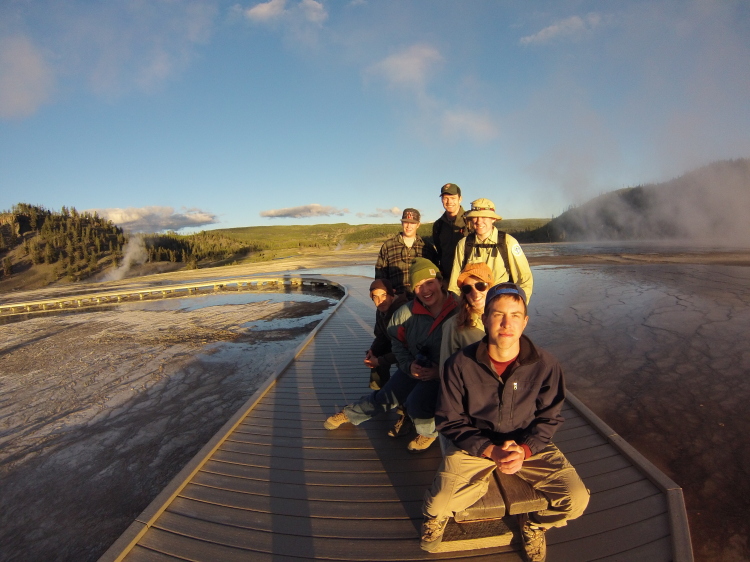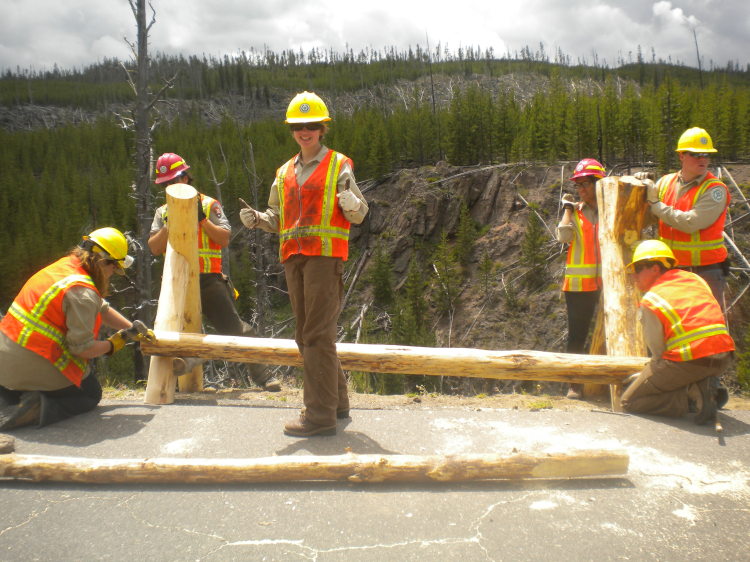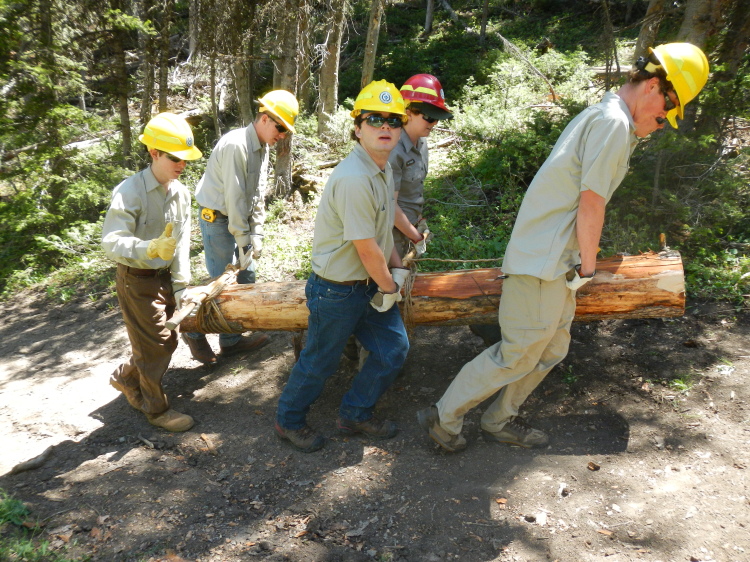
Thank you to Kristen Schulte, Crew Leader and Education Coordinator with Yellowstone’s Youth Conservation Corps, for sharing this article. Originally published on the Children & Nature Network website.
By Kristen Schulte and Jenny Moffett
Staring confusedly at her Youth Corps Crew Leader, Kelley could not understand how to install a preventative trail erosion structure. Finally, the Crew Leader told her to get an orange out of her backpack and roll it down the trail. He said, “Water acts like that orange. Get the orange to roll off the trail and water will too.” After trying this several times, the concepts of gravity, angles, and motion came to the surface of her mind. “So it’s like physics?” Experiences like this demonstrate that Youth Corps can contribute to understanding of scientific ideas by providing opportunities for inquiry in nature.
Similar to Kelley’s experience, during Ashley’s sophomore year in high school, she was told she would need to repeat biology over the summer. Ashley had two learning disabilities and was use to not feeling intelligent. The following summer, as a first-time Youth Corps member, she began to see the environment, ask questions, and seek ways to answer them. She learned scientific ideas on her own terms. Inspired, she sought a career in science and earned a college degree, something she had not previously imagined.

Youth Corps are organizations invested in a “common mission of engaging participants, in a combination of community service, workforce development, and education” (Gan et al., 2011). Annually Youth Corps enroll more than 33,000 participants, hailing from diverse backgrounds (United States 21st Century Conservation Service Corps, 2012). These organizations are a platform for both formal and informal learning in nature.
Such a platform exists in Yellowstone’s Youth Conservation Corps (YELL-YCC). It is one example of a Youth Corps that offers countless opportunities for scientific observation, inquiry, and discovery by connecting youth with nature. This occurs partly through work projects that foster the understanding of natural sciences. For example, fence building requires Youth Corps members to indirectly access geometric concepts to build quality fences.

Ecological relationships are taught in a formal Resource Education Curriculum and observed during weekend recreation. For instance, youth observe predator versus prey relationships while wolf watching and may then understand factors of trophic cascades. They later can use these ideas to support their own opinions on the ecological effects of wolves. Youth may never realize they are developing a new understanding of science, but on average, increase their understanding of key natural science concepts in the Greater Yellowstone Ecosystem (Figure 1). Figure 1. YELL-YCC natural sciences student self-assessment ratings. Youth complete a pre and post-session skills assessment. Featured are the results of a self-assessment question measuring student understanding of natural sciences in the Greater Yellowstone Ecosystem. Compared between pre and post-session assessment rating averages for three sessions of YCC (28 students) from 2011-2013. An overall average increase of 64% between pre and post-session ratings was observed.
Like YELL-YCC, a myriad of Youth Corps provide a medium for informal exploration of scientific inquiry as a function of time spent in nature. The Youth Corps experience develops competence in understanding scientific ideas, which supports an increasing body of knowledge that suggests science is effectively taught in nature (Falk & Dierking, 2010).
This piece is inspired by and dedicated to our many crew members, co-crew leaders, environmental educators, Children and Nature Network and the Natural Leaders. Thank you for support
Authors Bio’s
Kristen Schulte, Education Coordinator
A Missouri native, Kristen’s passion for the outdoors was ignited on a backcountry trail crew while in high school. Ever since this experience, she has dedicated her career to a myriad of organizations that emphasis environmental education while working with youth. Currently she serves as the Education Coordinator for the Yellowstone Youth Conservation Corps piloting her Master’s project, which was the development of the Resource Education Curriculum. In addition Kristen is a Natural Leader in the Children & Nature Network.
Jenny Moffett, Recreation Ranger
Jenny’s interest in the environment began when she was a student in the Yellowstone Youth Conservation Corps. Now a sophomore Conservation Biology major at Middlebury College in Vermont, she is interested in creating similar positive outdoor experiences for others and conducting biological research in the future. She has since returned to the Yellowstone Youth Conservation Corps as a Recreation Ranger summer staff and often leads her peers on outdoor recreation trips for Middlebury’s outdoor program.
References:
Falk, J. H., & Dierking, L. D. (2010). The 95 percent solution. American Scientist, 98(6), 486-493.
Gan, K.N., Jastrzab, J., Jefferson, A., Schneider, G., And Shlager, C. (2011). Youth Corps Emerging Practices For Education And Employment. Prepared For The Corporation For National And Community Service. Cambridge, Ma: Abt Associates Inc.
United States 21st Century Conservation Service Corps. (2012, September). 21st Century Conservation Service Corps (Full Report). Retrieved from https://Www.Doi.Gov/21csc/Progress/Upload/21csc-Full-Report-9-5-12.Pdf





































































